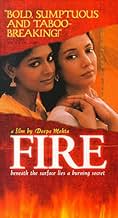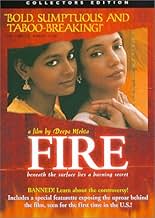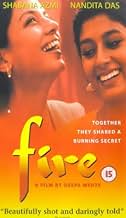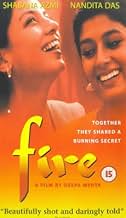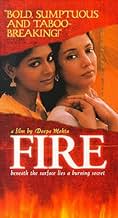Fire
- 1996
- Tous publics
- 1h 48min
NOTE IMDb
7,1/10
6,6 k
MA NOTE
Ajouter une intrigue dans votre langueTwo women who are abandoned by their husbands find love and solace in each other.Two women who are abandoned by their husbands find love and solace in each other.Two women who are abandoned by their husbands find love and solace in each other.
- Récompenses
- 7 victoires et 1 nomination au total
Jaaved Jaaferi
- Jatin
- (as Javed Jaffrey)
Devyani Saltzman
- Girl in video shop
- (as Devyani Mehta Saltzman)
Avis à la une
I was so pleased to discover this movie. The box here in America makes it sound like it is soft core porn with descriptions such as "erotic heat" and the like.
But I was moved by the relationship of these two women and how it reflected their place in society. I was so impressed by how Shabana Azmi (Radha) showed her character growing as she began to understand what she really needed in her life.
Also, early in the film I began to worry that maybe it would just be a movie about how younger women influence traditional families by bringing in new ideas, but the first time Radha and Sita make love, Sita (Nandita Das) seems innocent and unsure about what has happened (even though she initiates it.) I realize that as a character she is going through her own development that starts with a woman who is unsure of expressing her opinion to one who can give voice to what she thinks.
Also, how the family is portrayed seems real in that people do not just immediately change when presented with new ideas. What I mean is that in American movies, we have the tendency to have all the main characters "work things out" by the end of the movie. So when Radha's husband finds Radha and Sita together he doesn't just say he was wrong to ignore Radha and make it up to her. He struggles and falls just like real people do.
This was great work. Radha and Sita have a true romance and the world they occupy is believable and impressive.
P.S. Also a reviewer before me described several parts of the movie and said negative things about it, but couldn't have been watching it too closely since the reviewer confuses the names of all the principle characters. It is Radha that catches on fire not Sita, and Radha who is the elder wife.
Also, I disagree with the characterization that the movie portrays men as the bad guys. I feel it shows very human people. Even the eldest female character Biji turns a blind eye to the pain and feelings of her caregiver Radha. People (men and women) are not perfect and the mistakes made by Radha and Sita's husbands are real things that men actually do and think their wives should just go along with because they are the wives. Does that make them bad men? No. But it does make it a bad system, which I believe is the real foe in this film.
But I was moved by the relationship of these two women and how it reflected their place in society. I was so impressed by how Shabana Azmi (Radha) showed her character growing as she began to understand what she really needed in her life.
Also, early in the film I began to worry that maybe it would just be a movie about how younger women influence traditional families by bringing in new ideas, but the first time Radha and Sita make love, Sita (Nandita Das) seems innocent and unsure about what has happened (even though she initiates it.) I realize that as a character she is going through her own development that starts with a woman who is unsure of expressing her opinion to one who can give voice to what she thinks.
Also, how the family is portrayed seems real in that people do not just immediately change when presented with new ideas. What I mean is that in American movies, we have the tendency to have all the main characters "work things out" by the end of the movie. So when Radha's husband finds Radha and Sita together he doesn't just say he was wrong to ignore Radha and make it up to her. He struggles and falls just like real people do.
This was great work. Radha and Sita have a true romance and the world they occupy is believable and impressive.
P.S. Also a reviewer before me described several parts of the movie and said negative things about it, but couldn't have been watching it too closely since the reviewer confuses the names of all the principle characters. It is Radha that catches on fire not Sita, and Radha who is the elder wife.
Also, I disagree with the characterization that the movie portrays men as the bad guys. I feel it shows very human people. Even the eldest female character Biji turns a blind eye to the pain and feelings of her caregiver Radha. People (men and women) are not perfect and the mistakes made by Radha and Sita's husbands are real things that men actually do and think their wives should just go along with because they are the wives. Does that make them bad men? No. But it does make it a bad system, which I believe is the real foe in this film.
For a moment, let's put aside the cultural aspects of this movie, even if it is a very important side of it, and let's look at the simple fact that this is a very nice love story. Two individuals find themselves in a difficult situation, caused by two selfish husbands. They have to live through their sad days without any ray of hope. If each one of these two women had been alone, imagine what kind of life each one would have had to accept. They found each other and they fell in love. That this love was against all the social, religious and cultural laws of their environment is almost irrelevant. They loved each other, found relief in each other, that was sufficient. The reaction of the individuals around them is but a small fact that they have to accept, suffer even, and then they can go on with their lives, their life. Very nice.
9hira
This film powerfully demonstrates the struggle of two women in love in a culture so deeply entrenched in ritual and tradition. All this against a backdrop of an India which itself is struggling for freedom from these same values. This film is both political and personal and never too preachy or idealistic on either front. It is easy to see why "Fire" has caused riots in India, but tragic nonetheless. A true film such as this one deserves to be seen by all people of the world, not just privileged westerners.
This intelligent, moving and beautiful film is a study in the ways people react to tradition (reminds me of William Faulkner's novels).
The characters all feel trapped by the weight of the roles they are expected to assume, and seek for a way to live within those roles rather than throw them off altogether. But as the story develops the two wives, trapped in loveless marriages, draw together. Drawing on the strength of their friendship and love, they give each other the courage to abandon their roles.
They have found that living within their traditions is no life at all, it is a sort of living death: without passion, without true connection to others, without fulfillment. Although they know there will be a price to be paid for their rebellion and freedom, it is a price much less dear than the sacrifice called for by a comfortable, predictable existence.
The screenplay is wonderful, the acting marvelous. Near perfect!
The characters all feel trapped by the weight of the roles they are expected to assume, and seek for a way to live within those roles rather than throw them off altogether. But as the story develops the two wives, trapped in loveless marriages, draw together. Drawing on the strength of their friendship and love, they give each other the courage to abandon their roles.
They have found that living within their traditions is no life at all, it is a sort of living death: without passion, without true connection to others, without fulfillment. Although they know there will be a price to be paid for their rebellion and freedom, it is a price much less dear than the sacrifice called for by a comfortable, predictable existence.
The screenplay is wonderful, the acting marvelous. Near perfect!
In the contemporary India, Jatin (Jaaved Jaaferi) is a man in love with the Chinese Julie (Alice Poon), who does not want to get married and become a housewife, since she intends to move to Hong Kong and become an actress. Due to the pressure of his family asking for a baby, Jatin decides to get married with the virgin Sita (Nandita Das) in a arranged marriage. Sita moves to the house of Jatin's family, where live on the second floor the matriarch Biji (Kushal Rekhi), the servant Mundu (Ranjit Chowdhry) and the unfertile Radha (Shabana Azmi) and her husband Ashok (Kulbhushan Kharbanda). On the first floor, they run a small business of video rental and food. Ashok opted for the celibate, since in his opinion, sex would be only for procreation and never for lust or desire. Both women are neglected by their husbands, and their loneliness turns into a lesbian relationship. I do not know much about Indian society, but I found this movie a sensitive and delicate love story of two needy women, born and raised in a repressive and male society. The story is never vulgar or erotic, and it is very easy to understand their attraction. The beauty of Nandita Das is very impressive. The direction and the performance of the cast is outstanding. Another excellent example of the Indian cinema. My vote is eight.
Title (Brazil): 'Fogo e Desejo' ('Fire and Desire')
Title (Brazil): 'Fogo e Desejo' ('Fire and Desire')
Le saviez-vous
- AnecdotesDeepa Mehta after being inspired by Nandita Das in the film.She signed her for Earth 1947.(1999).
- ConnexionsFeatured in The Movie Show: Épisode datant du 13 août 1997 (1997)
- Bandes originalesBombay Theme
(1995)
Composed by A.R. Rahman
From the Bombay (1995) soundtrack
Available on CD & cassette from PolyGram India Ltd.
Courtesy of Mani Ratnam
Meilleurs choix
Connectez-vous pour évaluer et suivre la liste de favoris afin de recevoir des recommandations personnalisées
- How long is Fire?Alimenté par Alexa
Détails
Box-office
- Montant brut aux États-Unis et au Canada
- 402 749 $US
- Week-end de sortie aux États-Unis et au Canada
- 14 384 $US
- 24 août 1997
- Durée1 heure 48 minutes
- Couleur
- Mixage
Contribuer à cette page
Suggérer une modification ou ajouter du contenu manquant





